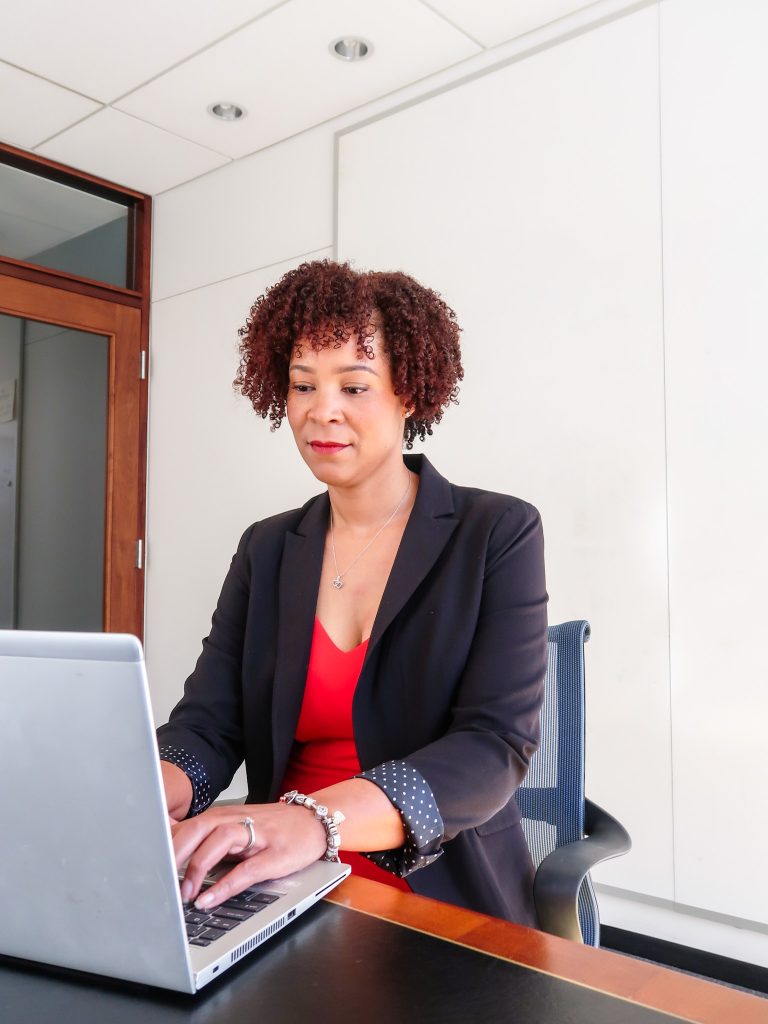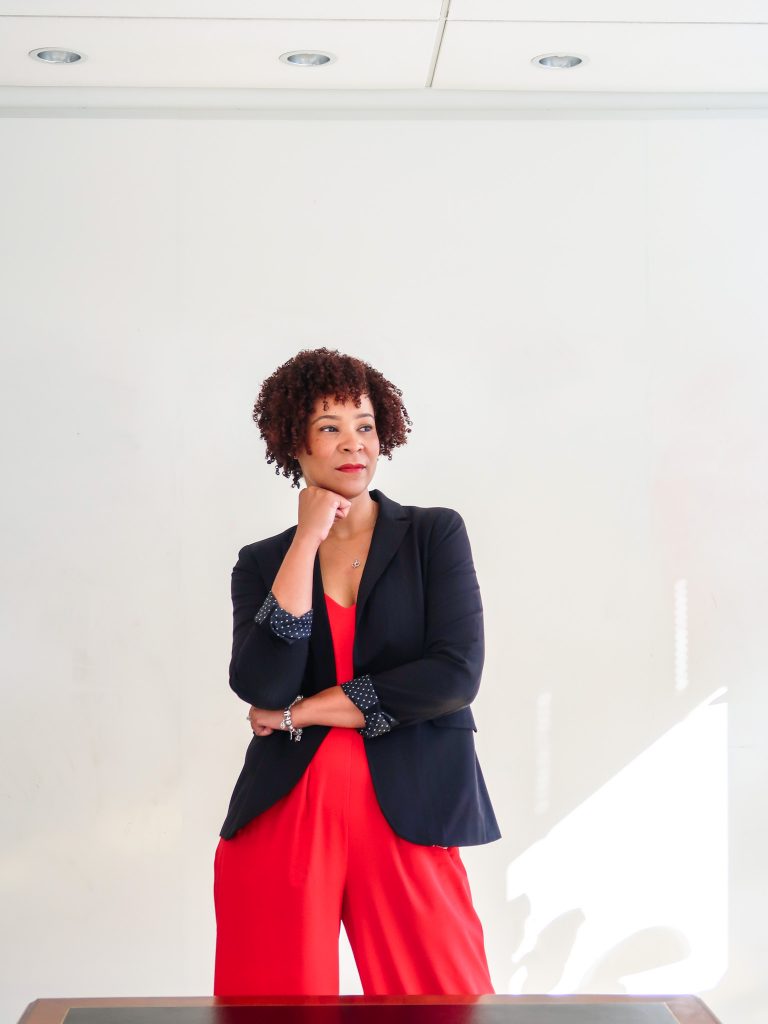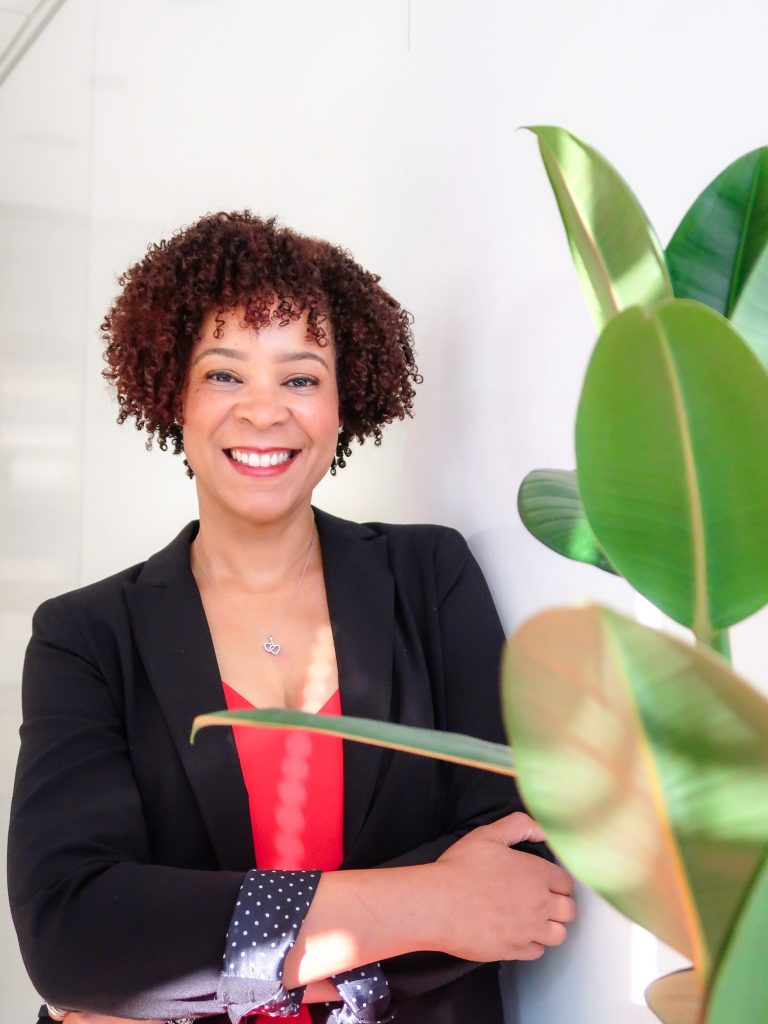How centering culture and those most impacted guide her vision for philanthropy at the Pittsburgh Foundation.
By Kenya Evelyn, with additional reporting by BlackPittsburgh.com staff
Growing up, Michelle McMurray was well-acquainted with the realities of racial and economic segregation. The current vice president of Program and Community Engagement at the Pittsburgh Foundation, she was raised in Fairmont, West Virginia, with its vivid fall landscapes, a tight-knit church community, and familial bonds.
Yet, it was also a place where opportunities for Black residents were scarce.
“If you were white and affluent, you lived on one side of town,” says McMurray of the nearly 90 percent white locale set about 20 miles south of Morgantown. “If you were Black, you were very much congregated into a tightly knit and loving community that also experienced a lot of struggle and disinvestment.”
McMurray knew early on that staying in her hometown would limit her potential. She attributes this realization to her mother.
“Some of my earliest memories are of my mother—who primarily raised me—fiercely advocating for me and my older sister to get the education that we deserved and to be treated with respect by our white peers and teachers,” she remembers.
During her childhood and teen years, McMurray recalls, she spent almost as much time in the stacks of the library where her mom worked, as she did in church pews, cultivating a love of learning and ideas beyond the standard curriculum.
“I can still remember the first time I read Nikki Giovanni’s Black Feeling, Black Talk, Toni Morrison’s The Bluest Eye and The Autobiography of Malcolm X [As told to Alex Haley]. Just…wow,” she says, reflecting on those years when she spent quality time also singing in the church choir and teaching Sunday school.
When McMurray graduated from high school, her mother (now a 25-year cancer survivor) was undergoing chemotherapy treatments.
“She refused to allow me to stay home with her, insisting that I explore beyond the boundaries of my hometown, become the first in our family to graduate from college—a dream she sacrificed when it proved difficult to find consistent, affordable childcare while attending night classes after she divorced my biological father,” says McMurray.
Moving to Pittsburgh in 1999 for college wouldn’t just mark a geographical shift; it would ultimately signify the start of a lifelong journey addressing the inequities she experienced growing up.
When you come from a community that’s been pushed aside, you understand the need for people who will show up and really listen.
Michelle McMurray, vice president of programming, The Pittsburgh Foundation
Back in Fairmont, it wasn’t just about economic survival—it was about building a network of support that offset clear adversity and disinvestment.
“I saw firsthand how much strength there was in my community,” she says. “That strength has been a guiding force in my approach to philanthropy; I want to help communities build on that resilience and support the aspirations they’ve long been denied.”
Leaving Fairmont was both an escape from limitations and a commitment to return in spirit, always knowing she wanted more for herself, “but also for the communities I came from.” This determination became a central tenet of her work in Pittsburgh.
In those early Pittsburgh years, as she transitioned from college, McMurray recognized familiar lines of segregation and opportunity—or the lack thereof—in the neighborhoods where she lived and worked.

Born and raised in Fairmont, West Virginia, McMurray came to Pittsburgh to attend Pitt and four years later decided to make Pittsburgh home. Photo Credit: Evangeline Mensah-Agyekum
“In my mid-20s, I was working as a research assistant on a study of depression in older adults,” she reflects. “I changed my major and ultimately decided to pursue a master’s degree after finding out that my maternal grandmother had bipolar disorder. I wanted to improve access to mental health care for Black families like mine.”
She spent the next decade as a researcher, policy advocate and social worker addressing mental health stigmas after receiving her master’s degree in social work at the University of Pittsburgh.
That work helped to hone her ability to connect with those in need. Thankfully, she met Dr. Charlotte Brown, who was working on mental health equity in underserved communities. Dr. Brown, an associate professor of psychiatry at the University of Pittsburgh School of Medicine, became her mentor.
“Instead of relying solely on the expertise of degreed experts, her work acknowledged the strengths and assets of Black communities in Pittsburgh, and her research sought to invest in that strength to produce change,” McMurray says, fondly remembering those years. “In every project that Dr. Brown led, she ensured that we started from a place of humility and respect for the lived experience of those we sought to support. She showed me what can happen when we recognize and amplify the power that already exists in communities.”
That experience afforded her a deep understanding of the nuances of community needs and trust building.
“[It] taught me a lot about access to care,” she says. “Understanding the importance of meeting people where they are, learning about their backgrounds and cultures, and partnering with them to create solutions has to be a core principle in this work.”
Today, at the Pittsburgh Foundation, McMurray leverages those lived experiences to advocate for a more inclusive and equitable philanthropic landscape. Contrary to common misconceptions, that work involves more than distributing funds. For McMurray, it’s also about transforming how philanthropy operates.
Philanthropy itself is now undergoing a paradigm shift in how foundations approach their missions, one that McMurray is fully aligned with. Rather than the traditional top-down approach, she advocates for a deeply personal strategy centered on the hopes and needs of the communities that foundation aims to serve.
“We are attempting to take an approach that looks at what people are dreaming about for themselves, their families, and their communities,” she explains.
Central to her approach are two core concepts: cultural competency and community-led decision-making. Both involve not just seeking input from community members but empowering them to decide how funds are allocated.
That strength has been a guiding force in my approach to philanthropy; I want to help communities build on that resilience and support the aspirations they’ve long been denied.
Michelle McMurray, vice president of programming, The Pittsburgh Foundation
The Advancing Black Arts in Pittsburgh program, for instance, employs community panels to select grant recipients, ensuring those with firsthand experience and understanding of the community lead the decision-making process.
“When you come from a community that’s been pushed aside, you understand the need for people who will show up and really listen,” McMurray explains. “Culturally competent philanthropy isn’t just about awareness—it’s about honoring people’s stories and making them active partners in their own progress. And who better to make recommendations about who should receive dollars than artists themselves?”
Her approach to her work is further sharpened when she considers reports like The Economist’s 2018 Global Liveability Index, which ranked Pittsburgh second in the world for livability. Having built a career with a focus on racial equity and community engagement, McMurray knows that the liveability index doesn’t reflect the reality of Black residents born and raised here.
McMurray believes data like this underscores the importance of transparency and accountability, which lead to more impactful, meaningful work. “It requires relationships and partnerships [with] people who are willing to be critical friends, she says, “to not only tell us what we want to hear but also where we are falling short.”
McMurray also considers findings like a 2020 report from the National Committee for Responsive Philanthropy, and one from the Philanthropic Initiative for Racial Equity. The first report shows that only one percent of Community Foundation dollars are “explicitly designated” toward Black communities in the 25 cities analyzed, despite Blacks representing 15 percent of the population in those cities. The second showed that while there was growth in funding racial justice from 2015 to 2020, it fell short of addressing core needs.
To address these disparities, the Pittsburgh Foundation conducted its own internal review and recently committed $50 million to racial equity and justice work, with the intention that at least half of its grants will go to BIPOC-led nonprofits

McMurray says her mom set the tone for her career in philanthropy: “I regularly watched my mom give her time, talent, treasure, testimony, and tithes simply because of her love of humanity. She has been a constant source of inspiration, reminding me that all we have is all we need to make a difference in this world.” Photo Credit: Evangeline Mensah-Agyekum
“If we are serious about changing that reality, we need to get serious about making sure that the most vulnerable of us have an opportunity to thrive,” McMurray asserts.
McMurray’s strategies and insights offer a model for philanthropic organizations throughout the country, particularly fellow Rust Belt cities facing similar socioeconomic and racial justice challenges.
“It’s one thing to talk about equity and justice externally, but it has to be reflected internally as well,” she says. This holistic approach is designed to make the foundation’s commitment to equity more sustainable over time.
The key, she says, is bringing to bear all available assets.
“How do we tap into all the resources that we have to bring more people into dialogue about how to make this a place where everyone has an opportunity to thrive?” she asks.
This approach goes beyond mere awareness of cultural differences; it involves active, ongoing engagement with community members to understand their needs and aspirations.
While finding her life’s work from West Virginia to Pennsylvania was instrumental in her evolution, it’s one she doesn’t want for future generations of Black women—at least not out of necessity.
“I want a world where young Black women don’t have to leave their communities to find success,” she says. “If I can help create that world, in Fairmont, in Pittsburgh, and beyond, then I’ve honored where I come from and hopefully paved the way for others to stay and succeed in their hometowns.”
Kenya Evelyn is an award-winning, freelance multimedia journalist with more than a decade of experience covering news, politics, sports, and more—all with a concentration on culture and identity.


